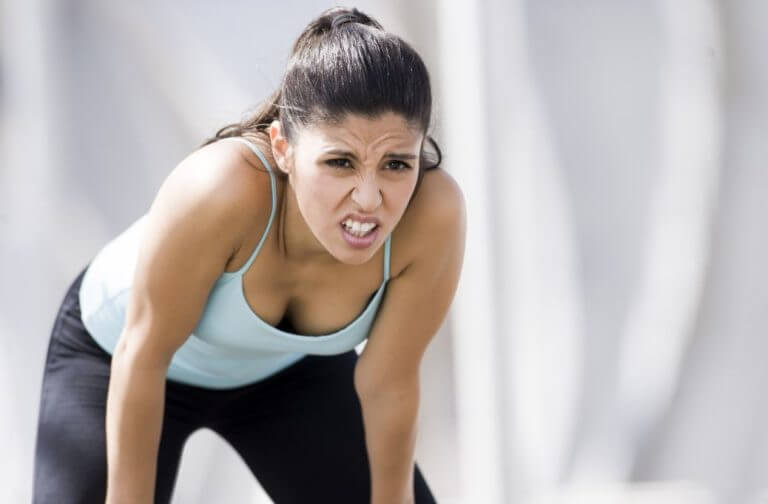The Relationship Between Sexual Activity and Sports Performance

We’ve talked about how sexual activity is beneficial for our health on numerous occasions. Among its most outstanding benefits is the increase of endorphins and hormones such as dopamine, that help us to be in a good mood and release built-up stress.
This activity also involves an important calorie expenditure that we could consider as a plus for our daily physical activity. But there’s still some controversy about the subject. Many online articles claim that sexual activity can decrease our sports performance. In this article, we’ll clear up the relationship between sexual activity and sports performance.
Sexual activity: benefits
Sexual activity, whether we practise it with a partner or by ourselves, is beneficial in many aspects. Let’s take a deeper look into some of these benefits to link them with the possible alterations in our sports performance.
- Strengthens the immune system since we are exposed to harmless bacteria that may be similar to other virulent ones. This way, when we come into contact with these bacteria, our defences will already be prepared.
- Helps to combat stress. It releases hormones that activate the reward system and help us feel accomplished, such as dopamine. This can also help to improve our self-esteem.
- Improves cardiovascular health. This is because our body produces vasodilator substances that reduce our blood pressure while we’re engaging in the activity.
- As we’ve said before, we can think about it as a light physical activity. Sex, especially when it’s with a partner and lasts for more than 30 minutes, can burn as many calories as running at a moderate pace.

- When we have an orgasm, our body produces endorphins and prolactin. These hormones are responsible for the characteristic feeling of sleepiness that we get after the climax. They help us to relax and fall asleep.
Sexual activity and sports performance
On many occasions, some have assured that sex or masturbation can be harmful to our sports performance. The main theory they’ve used to claim this is that during sex the levels of testosterone in our body decrease, especially in men. Testosterone is the main anabolic male hormone, and it plays a very important role in sports performance. In women, an alteration of the estrogen levels could produce similar effects, but to a lesser extent.
With that being said, this theory is nothing more than a hoax. Regular sexual activity is not harmful to our sports performance in the slightest. As a matter of fact, it’s very beneficial, with the exceptions that we’ll talk about in a moment.
How sexual activity improves our sports performance
Increases the testosterone levels
Not only does sexual activity not reduce the levels of this hormone, but it actually stimulates the secretion of testosterone to the blood from the testicles. This boosts the libido or sexual desire. On top of this, it also stimulates muscular anabolism, the genesis of strength and the general improvement of our physical condition and sports performance.
It helps to rest better
As we said before, the secretion of certain substances after an orgasm can help us to fall asleep and reduce stress. This makes our sleep a lot deeper and healing.
The improvement in our rest quality not only helps us to recover better from the effort we made, but it also stimulates the secretion of the growth hormone. This allows us to build more muscle mass and improve our sports performance.

When can it be harmful?
Sexual activity is very beneficial for our health, and any expert would recommend practising it regularly. However, when we practice certain sports and want our training sessions to be productive, we should avoid engaging in sexual activity minutes before the session.
This is because, as we’ve explained before, sex produces a release of hormones that calm us and make us sleepy. This state is something we want to avoid before working out since the best thing we can do is face a workout with energy and vitality.
Therefore, we recommend postponing all sexual activity until the end of your training sessions.
We’ve talked about how sexual activity is beneficial for our health on numerous occasions. Among its most outstanding benefits is the increase of endorphins and hormones such as dopamine, that help us to be in a good mood and release built-up stress.
This activity also involves an important calorie expenditure that we could consider as a plus for our daily physical activity. But there’s still some controversy about the subject. Many online articles claim that sexual activity can decrease our sports performance. In this article, we’ll clear up the relationship between sexual activity and sports performance.
Sexual activity: benefits
Sexual activity, whether we practise it with a partner or by ourselves, is beneficial in many aspects. Let’s take a deeper look into some of these benefits to link them with the possible alterations in our sports performance.
- Strengthens the immune system since we are exposed to harmless bacteria that may be similar to other virulent ones. This way, when we come into contact with these bacteria, our defences will already be prepared.
- Helps to combat stress. It releases hormones that activate the reward system and help us feel accomplished, such as dopamine. This can also help to improve our self-esteem.
- Improves cardiovascular health. This is because our body produces vasodilator substances that reduce our blood pressure while we’re engaging in the activity.
- As we’ve said before, we can think about it as a light physical activity. Sex, especially when it’s with a partner and lasts for more than 30 minutes, can burn as many calories as running at a moderate pace.

- When we have an orgasm, our body produces endorphins and prolactin. These hormones are responsible for the characteristic feeling of sleepiness that we get after the climax. They help us to relax and fall asleep.
Sexual activity and sports performance
On many occasions, some have assured that sex or masturbation can be harmful to our sports performance. The main theory they’ve used to claim this is that during sex the levels of testosterone in our body decrease, especially in men. Testosterone is the main anabolic male hormone, and it plays a very important role in sports performance. In women, an alteration of the estrogen levels could produce similar effects, but to a lesser extent.
With that being said, this theory is nothing more than a hoax. Regular sexual activity is not harmful to our sports performance in the slightest. As a matter of fact, it’s very beneficial, with the exceptions that we’ll talk about in a moment.
How sexual activity improves our sports performance
Increases the testosterone levels
Not only does sexual activity not reduce the levels of this hormone, but it actually stimulates the secretion of testosterone to the blood from the testicles. This boosts the libido or sexual desire. On top of this, it also stimulates muscular anabolism, the genesis of strength and the general improvement of our physical condition and sports performance.
It helps to rest better
As we said before, the secretion of certain substances after an orgasm can help us to fall asleep and reduce stress. This makes our sleep a lot deeper and healing.
The improvement in our rest quality not only helps us to recover better from the effort we made, but it also stimulates the secretion of the growth hormone. This allows us to build more muscle mass and improve our sports performance.

When can it be harmful?
Sexual activity is very beneficial for our health, and any expert would recommend practising it regularly. However, when we practice certain sports and want our training sessions to be productive, we should avoid engaging in sexual activity minutes before the session.
This is because, as we’ve explained before, sex produces a release of hormones that calm us and make us sleepy. This state is something we want to avoid before working out since the best thing we can do is face a workout with energy and vitality.
Therefore, we recommend postponing all sexual activity until the end of your training sessions.
All cited sources were thoroughly reviewed by our team to ensure their quality, reliability, currency, and validity. The bibliography of this article was considered reliable and of academic or scientific accuracy.
- Anshel, M. H. (1981). Effects of Sexual Activity on Athletic Performance. The Physician and Sportsmedicine, 9(8), 64–68. https://doi.org/10.1080/00913847.1981.11711137
- Stefani, L., Galanti, G., Padulo, J., Bragazzi, N. L., & Maffulli, N. (2016). Sexual Activity before Sports Competition: A Systematic Review. Frontiers in Physiology, 7, 246. https://doi.org/10.3389/fphys.2016.00246
- Zavorsky, G. S., Vouyoukas, E., & Pfaus, J. G. (2019). Sexual Activity the Night Before Exercise Does Not Affect Various Measures of Physical Exercise Performance. Sexual Medicine, 7(2), 235–240. https://doi.org/10.1016/j.esxm.2018.12.002
This text is provided for informational purposes only and does not replace consultation with a professional. If in doubt, consult your specialist.








